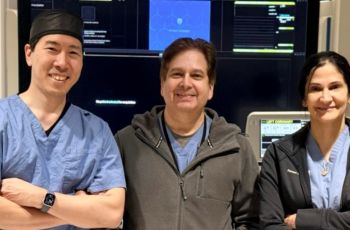
WASHINGTON (Sept. 19, 2013) – Dominic Raj, M.D., director of the division of nephrology and professor of medicine at the George Washington University (GW) School of Medicine and Health Sciences, was the recipient of two prestigious UO-1 grants from the National Institutes of Health (NIH). These multi-million dollar studies will examine the role of gut microbiome on inflammation and cardiovascular disease.
Currently, more than 20 million people in the United States have Chronic Kidney Disease (CKD), according to the Centers for Disease Control. For patients with CKD, traditional medications to treat cardiovascular issues have often been unsuccessful. It is believed that many of these medications do not work because of underlying chronic inflammation in these patients. Previous work from Raj’s laboratory showed that the cause of inflammation in patients with kidney disease may be due to the release of endotoxin from bacteria. They showed that a higher level of endotoxin is associated with mortality in patients with kidney disease.
Hypothesizing that endotoxins appearing in the blood may come from the gut, Raj believes that if he is able to modulate the gut microbiome to reduce the level of endotoxin, this will in turn reduce inflammation, leading to a decrease in cardiovascular mortality in patients with kidney disease.
“Traditional cardio-protective interventions have had minimal success in patients with kidney disease” said Raj. “This research is focused on finding a safe and effective treatment that reduces inflammation and prolongs survival of these patients.”
For his first UO-1 project, titled “Anti-inflammatory Therapy in Diabetic CKD,” Raj will work with University of Pennsylvania, Harvard University, Vanderbilt University, and Washington University. As the principal investigator for this multi-million dollar grant, he will examine the effect of two anti-inflammatory therapies on slowing progression of atherosclerosis and protein-energy wasting in hemodialysis patients.
For his second UO-1 project, titled “Gut Microbiota and Atherosclerosis in ESRD,” Raj will collaborate with the Cleveland Clinic, University of California San Diego, University of Miami, and University of Utah. As the principal investigator for this multi-million dollar grant, he will examine the effect of two novel anti-inflammatory therapies on slowing progression of atherosclerosis and left ventricular hypertrophy in patients with CKD.
This consortium of experts in kidney disease, brought together by the National Institute of Health, will test multiple novel therapies targeting different pathways in a collaborative manner.
“It is exciting to be working with a team of outstanding, world renowned investigators to identify the most effective treatment for one of the most vulnerable patient populations that we know of,” said Raj.


